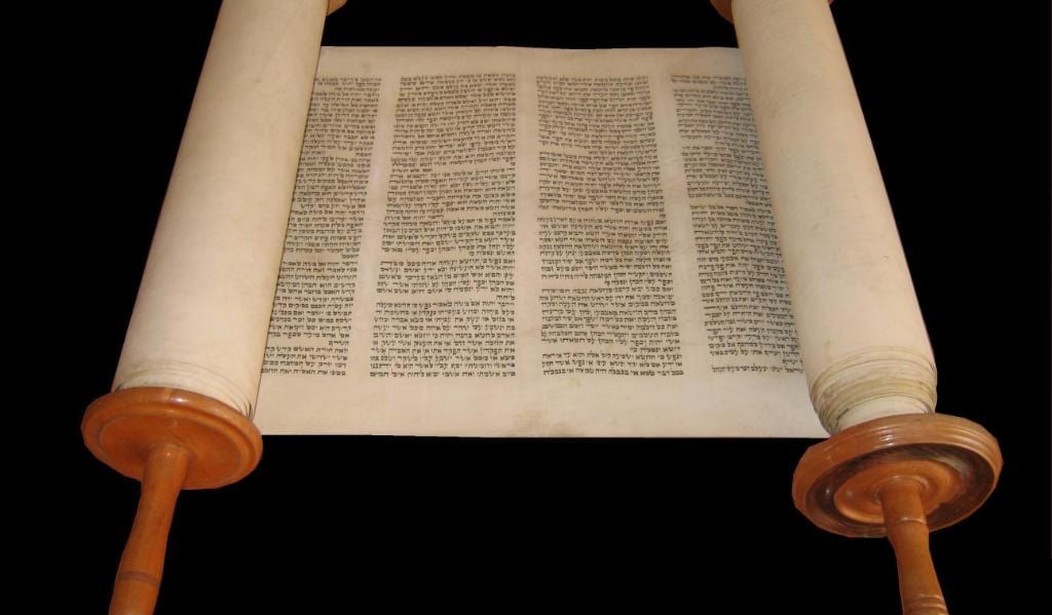We’re publishing a weekly series of articles covering each week’s Torah portion as a rabbi (such as the author) might do via a talk in a synagogue. The series is tailored so it may also be read by non-Jews who may be interested in how Jews read and interpret Scripture. Click here for the first article in the series.
Dëvar Torah – Parashath BëHa‘alothëcha (Numbers VIII,1-XII,16)
Among the topics encountered in this week’s parasha we read of Israel’s departure from the camp at Sinai bashana hashénith bachodesh hashéni bë‘esrim lachodesh (“in the second year in the second month on the twentieth of the month;” X,11), i.e. 20 Iyyar 2449. In the hustle and bustle of Israel’s breaking camp, the Torah tells us, Vayomer Moshe lëChovav ben Rë‘u’él chothén Moshe, Nosë‘im anachnu el hamaqom asher amar Ha-Shem, Otho ettén lachem lëcha ittanu vëhétavnu lach ki Ha-Shem dibber tov ‘al Yisra’él (“And Moshe said to Chovav ben Re‘u’el, Moshe’s father-in-law: we are traveling to the place concerning which Ha-Shem has said, I shall give it to you; go with us and we shall be good to you. For Ha-Shem has spoken well of Israel;” ibid., 29). Yithro (the name by which Chovav is most commonly known) turned Moshe down: …Lo’ éléch ki im el artzi vë’el moladti éléch (“I shall not go [anywhere] but to my land, and to my native land will I go;” ibid., 30), whereupon Moshe remonstrated with him: Al na ta‘azov othanu ki ‘al kén yada‘ta chanothénu bamidbar vëhayitha lë‘éynayim. Vëhaya ki théléch ‘immanu vëhaya hatov hahu asher yéytiv Ha-Shem ‘immanu vëhétavnu lach (“Don’t leave us, please, because for this reason have you known our camp in the desert and you have become our eyes. And it will be that you will go with us and that goodness which Ha-Shem will do with us, we shall [in turn] do for you;” ibid., 31-32). This seems to have satisfied Yithro.
On the surface, it is hard to see what Moshe said the second time that was so much more persuasive than the first. “Go with us and we’ll be good to you, for Ha-Shem has spoken well of us” doesn’t seem much different than, “Go with us and we’ll be good to you according to the good which Ha-Shem will do for us.” What was the actual issue over which Yithro proposed returning to Midyan?
The Sifrei on our parasha (section 20) may provide us with a clue. Moshe quoted Ha-Shem’s promise to grant Eretz Yisra’él to Israel as Otho ettén lachem, whence the Sifrei derives: “Lachem”, vë’éyn lagérim cheleq bo (“To you,’ but the converts have no part in it.”) The Sifrei then quotes Ezekiel XLVII,23: Vëhaya hashevet asher gar hagér itto, sham tittén nachalatho (“And it will be that the tribe with which the convert lives, there shall you give him his estate”), which seems to imply that gérim can own landed property in Eretz Yisra’él. The Sifrei resolves the apparent contradiction by concluding nittan lagérim qëvura bë’Eretz Yisra’él (“Gérim are granted burial in Eretz Yisra’él”), i.e. their estate is limited to a burial plot, four amoth square.
This notion finds some support in a curious ruling by the Rambam (Hilchoth Shëluchim vëShuttafin III, 7). The question under consideration is that of someone who has given a package of money to someone else for safe-keeping, and now wishes to appoint a representative (shaliach) to bring him the money. Since money per se is untraceable and unidentifiable, a process called harsha’a (literally “granting permission”) is used to ensure the delivery. The shaliach grants title to a piece of real property to the money’s original owner against the value of the money to be delivered. The Rambam then goes on to say that if the shaliach owns no property, “then the shaliach grants title to the money’s owner to four amoth of his portion in Eretz Yisra’él and the owner grants title to money against it.”
This specification of four amoth of land seems odd, since it obviously has no direct relationship to the mount of money involved. The Torah Tëmima cites the Haghoth Maimuniyoth (a commentary on the Rambam) that the reason is “perhaps (the shaliach) is a descendant of converts” in which case, according to the ruling of the Sifrei, the only land in Eretz Yisra’él which he could claim would be his four amoth.
Now let’s re-visit the conversation between Moshe and his father-in-law in light of the above. The Ramban tells us that Yithro understood Moshe’s original offer to mean “that they would give him silver and gold, and garments and sheep and cattle from the spoils [of Egypt], but that he would have no estate (nachala) among them.” This offer Yithro rejected. “If I were concerned with wealth,” the Ramban suggests that he meant, “then I can go home, for there I have property and possessions and honor.” This brought Moshe to remonstrate with him: Please don’t leave us; if you go with us, from the good which Ha-Shem is yet to grant us, we shall make you a gift. Indeed, as Rashi notes, at the time that Eretz Yisra’él came to be divided up among the tribes, there arose a dispute concerning the disposition of the region around Jericho, and so it was granted, if only temporarily, to Yithro and his family (cf. Judges I,16).
Rashi tells us that Moshe offered Yithro this special arrangement “so that they would not say, Yithro did not convert out of love for Ha-Shem; he thought that converts had a portion in the Land; now that he saw that they do not have a portion, he left them and went on his way.” This suggests that Yithro was motivated by something other than a venal desire to participate in Israel’s “land-grab” from the Canaanites, but the Ramban’s characterization of Moshe’s original offer sounds very much like the impression Moshe allegedly wanted to avoid. In what way did his true motivation differ? Why, in fact, would people have accused him of venality in the first place?
The Sifrei itself, elsewhere in our parasha, makes a statement which calls the assumptions of the foregoing into question. In IX,14 we read, in part: …chuqqa achath yihye lachem vëlagér ulë’ezrach ha’aretz (“…one law will there be for you, for the convert and for the citizen of the land”), and the Sifrei clarifies: “The Scripture has come and made the convert equal to the citizen in all mitzvoth in the Torah.”
The implications of this are brought home by another ruling of the Rambam. In Hilchoth Bikkurim II,1 he tells us: “It is a positive commandment to bring first fruits (bikkurim) to the Temple; and they are not customary save when there is a Temple and only in Eretz Yisra’él….” He then goes on to say explicitly: “ The convert brings (bikkurim) and reads (Deuteronomy XXVI,1-11;” ibid., IV,3.)
The Rambam here is telling us that a gér bears the same responsibilities as any other Jewish land-owner in Israel; unless we are to believe that the bikkurim come from a garden planted on his burial plot, it appears that a gér can own land in Eretz Yisra’él. The Rambam justifies this very conclusion by noting that the land was first given to Avraham, the av hamon goyim (“father of a multitude of nations”) and “adoptive father” of all converts; since the promise was first given to him, it applies to all his descendants, natural and “adopted” (op. cit. ibid.)
Thus we seem to have a contradiction between one part of the Sifrei and another, and between one ruling of the Rambam and another. How are we to resolve it?
There is another midrash which seems to bear on our question and may provide a solution. In Qoheleth Rabbathi I,18, commenting on the verse kol hanëchalim holëchim el hayam (“all streams run to the sea;” Ecclesiastes I,7), the midrash concludes that all of the gérim converted in the course of Israel’s exile will come to reside in Eretz Yisra’él during the Messianic Period, vëhayam éynenu malé’ (“and the sea is not filled;” ibid.) i.e. there will be room for all. The Torah Tëmima cites this midrash, and suggests that it indicates a difference between these later converts and those of Moshe’s day (the ‘erev rav the “mixed multitude” who left Egypt with Israel), “for the intentions of the first ones were not so much for the sake of Heaven, but only because Israel was in the ascendancy,” i.e. there was an element of opportunism in their motivation.
Now let us once again re-visit Moshe’s dialogue with Yithro. Note that the verse does not call him Yithro, but rather Chovav, the Hebrew name which Yithro assumed upon his conversion (cf. Ramban ad loc.) The name means “Beloved,” and is perhaps a hint that this convert was different from the others of his day. Yithro, after all, had already embraced monotheism and abandoned idolatry before he even met Moshe. This was why, for example, his daughters were harassed by the Midyanite shepherds. He had already included himself among the servants of Ha-Shem. As such, he had no ulterior motives, no desire for “silver and gold and sheep and cattle;” for that, he could return home. He simply wanted a nachala among the rest of Israel.
The Torah Tëmima’s distinction between earlier and later converts goes far to explain the seeming ambiguity of Torah sources toward converts. On the one hand, the Talmud tells us, “Converts are as hard on Israel as a skin-sore” (Yëvamoth 47b) in part, as Rashi explains, “because they cling to their original practices and Israel learn from them,” a perfect description of the mind-set of the ‘erev rav, who set off the panic which led to the Golden Calf.
On the other hand, we learn elsewhere that, e.g. “a gér who converts for the sake of Heaven merits that his sons will have sons who will be Israel’s holy treasures” (BëMidbar Rabba VIII,10, “and some of his daughters will marry kohanim” (Qohleleth Rabbathi VII<20) and especially “gérim who are occupied in Torah are equal to the Kohén Gadol;” (Midrash Tanchuma, VaYaqhél 8).
Thus, it seems that the four amoth to which the Sifrei and the Rambam refer is the minimum nachala, appropriate to those gérim who, like the ‘erev rav, had ulterior motives and were thus not so much for the sake of Heaven; Moshe’s offer of a nachala as the gift of Israel to Yithro was to prevent his being tarred with their brush. He belongs in the latter group, true adopted sons of Avraham, meriting to bring bikkurim to the Miqdash (as, in fact, we learn from Yërushalmi Bikkurim I,4 concerning Yithro’s descendants).









Join the conversation as a VIP Member